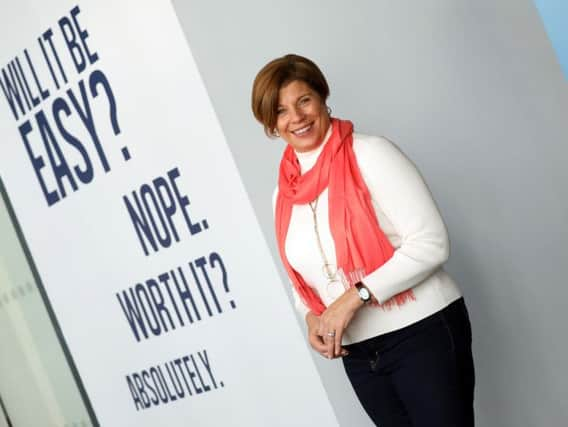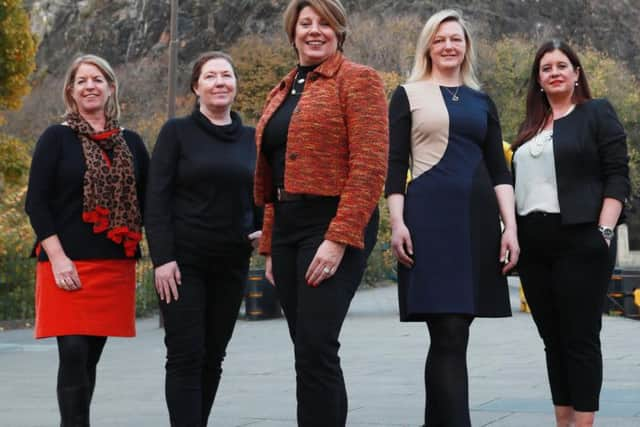The Big Interview: CodeClan chief executive Melinda Matthews-Clarkson


The technology sector supports 100,000 Scottish jobs and is expected to grow one-and-a-half times faster than the overall economy this decade. This is just the tip of the iceberg. The country’s urgent need to train and upskill workers in digital skills cuts far deeper, as tech becomes ever more ingrained in almost every sector imaginable. From healthcare and agriculture to policing and construction.
It’s been just over two years since Melinda Matthews-Clarkson became chief executive at CodeClan, Scotland’s first digital skills academy, set up in 2015 to address the skills gap. The former IBM sales executive made a life transition similar to that required of her full-time students, adapting from “flying around the world twice in a year, with 17,000 clients and 200 employees” to setting her feet firmly on the ground at CodeClan’s flagship Edinburgh campus. It was the culture shock that challenged her as much as the career step-change.
“I’ll own up to it, I almost quit in the first six months,” she recalls. “I’m an optimistic person and I was a mess when I joined here, trying to figure out how to fit in. I was probably the only extrovert in the whole place. It was a shock.” US native Matthews-Clarkson had spent 19 years at IBM, with the last ten of these in a global job. Essentially living on the road, she even came to recognise that “certain planes had different odours”. She later cut down to fewer than 180 days travel a year to qualify for British citizenship requirements and parted ways with IBM not long after, with the IT group since selling off the business arm of which she was vice president.


She was soon headhunted for the top job at CodeClan, a role where she could stay local, use her software and marketing skills and allow herself to be the “natural cheerleader” she is.
Less than half a year into her tenure the academy won a nationwide award for its standard of education. Matthews-Clarkson says: “I went in to all of the instructors – who really are the heartbeat of this place and I have such respect for them – with my cheerleader attitude and was like, ‘You rock! Absolutely amazing!’ Totally American. No-one said anything.”
Learning a new language
A colleague took her to one side and said until she addressed each of the team’s issues individually, she wouldn’t get a response. She realised that she and her staff couldn’t hear each other properly; she was an extrovert salesperson addressing a room of introverts “in a different language”.
She went home dispirited, but found a LinkedIn Learning session to help change her leadership style to fit the business. “I listened to it three times that weekend: in the bath, on the bike, walking with my iPod, until I got it. On the Monday I implemented what I had learned, and it worked like that,” she recalls, clicking her fingers. Impromptu meetings went out the window, agendas were sent out days ahead of schedule – her team needed time to prepare and process. Everything became more planned and thoughtful. Matthews-Clarkson became a student herself, dedicating six weeks to CodeClan’s programming course, and began “dreaming in code” after week three.
The CodeClan curriculum is moulded by industry, adapted each year to tackle specific subsectors which commercial partners judge to be in greatest need. The academy has more than 250 partners, and counting. It also has a campus in Glasgow and launched last year in Inverness.
CodeClan’s three to four-month training courses teach anyone how to become a software developer or data analyst, but under the influence of Matthews-Clarkson, it has begun to give them the soft skills needed to become well-rounded employees. Instructors now account for just 70 per cent of staff, as she has doubled headcount to 50, adding learning support as well as teachers.
“In our fast-paced technical world we need to be resilient problem solvers,” she says. “We don’t need to know everything, but we need the ability to understand that we can go figure it out. And the one that I’m really passionate about is that we know how to be well, personally and in the workplace. As a boss of many people in my time, the employee who turns to you and says, ‘I’m done, I’m going home.’ They’re the ones you respect because they’re self-managing their work and time, versus having to be managed and told to go home because they’re overworked and end up sick two days later.”
'Women pretty much sail out of here'
She introduced “Wellness Wednesdays” and “Crafty Tuesdays”. Career sessions became a weekly occurrence with interview prep, networking sessions and one-to-ones with the CEO, who also teaches several business classes. Matthews-Clarkson pulled the vending machine and transformed the interior design of the building – even painting it herself over the Christmas break. “My family weren’t allowed their presents unless they put in five hours,”she jokes. “This place had that image of a basement where teenage boys hang out in their stinky shoes and play games all the time.” She added plants, colour, sociable learning spaces.
All of this, as well as creating a calmer learning environment, makes the academy attractive to a more diverse range of people, she says. Around 32 per cent of CodeClan’s students are women, which beats the Scottish sector average of 23 per cent, and the UK’s 18 per cent. She’s also been building up her (all-female) leadership team and CodeClan has partnered with Smart Works, a charity supporting unemployed women which is backed by the Duchess of Sussex. Every female CodeClan student attends a Smart Works session to receive an outfit suitable for interviews and relevant coaching. The organisation is close to Matthews-Clarkson’s heart.
She confesses that she was wrong-footed the first time she heard of women suffering from “imposter syndrome” – the fear of having achieved undeserved success – or being told they were getting “above their station”. “We don’t have these in the US,” she says. “It’s just not part of an American statement. We’re the complete opposite of that. Both of those, imposter syndrome and getting above your station, is about there being boxes that you need to fit in. And when you get outside that box, you’re to question yourself and others have the right to question you. That’s just bizarre. I like to inject that you can be outside of your box. The whole reason why you came here as a student was to grow outside of it. And the women pretty much sail out of here.”
Matthews-Clarkson believes this is partly because employers want diversity, and partly a knock-on effect of the academy’s open-door policy. “When hiring companies come along they can see who’s leading and who’s not. And the women just get organised.”
Changing lives
She labels the school’s inclusive learning technique its “secret sauce”. Students don’t dial in or use e-learning, they get together in person to solve problems as a group. This physical presence, however, requires space, which is one of only two barriers to CodeClan’s growth, she believes, along with retaining high-quality teaching staff.
Her initial objective was to evolve CodeClan into a commercial business. Between 2015 and 2018 the academy received £2.6 million in government funding, but now it is flying solo. “We’ve since put 800 people into the market, about 70 per cent of whom still have jobs in Scotland. Those people that were making say £16,000 to £18,000 a year now average between £25,000 and £28,000. That’s about £3m of additional income that has come into the Scottish industry. So we’ve actually paid back now what they put in, just in taxes.”
The academy relies predominantly on student fees and industry partnership. It offers a range of tie-ups, with an increasingly popular option seeing companies sponsor existing employees to become “technical agents of change” in their organisations. CodeClan also intends to roll out bite-sized data courses which can benefit professionals looking to add an extra string to their bow in their current industry.
“Scotland has to have technically savvy people, from your granny to my age group through to the next generations,” says Matthews-Clarkson. “I think there’s going to be a whole group of people that are going to come through that are in their late 60s right now. They will be facing cyber security issues, online access to their pensions, avoiding scams. If we don’t educate them, that’s going to take our society down.”
Last year CodeClan introduced its Client Xperience scheme, partnering students with charities and community organisations that lack technical resources. This allows students to spend two weeks transferring classroom skills to a real-world environment while making a social impact. Projects have included a tie-up with Alzheimer Scotland to create a programme compatible with Alexa that can be personalised to support those living with Alzheimer’s disease or dementia.
As Matthews-Clarkson says: “It’s a feel-good job. At IBM I was selling software; in this, I feel sometimes I’m selling happiness. Our students change their lives.”